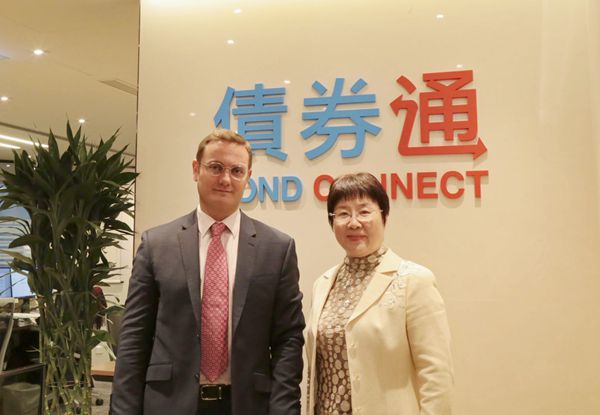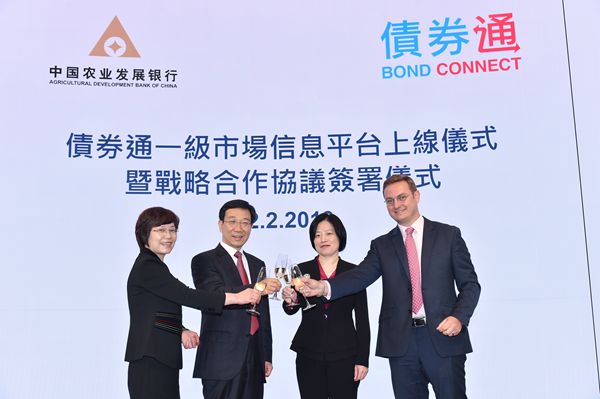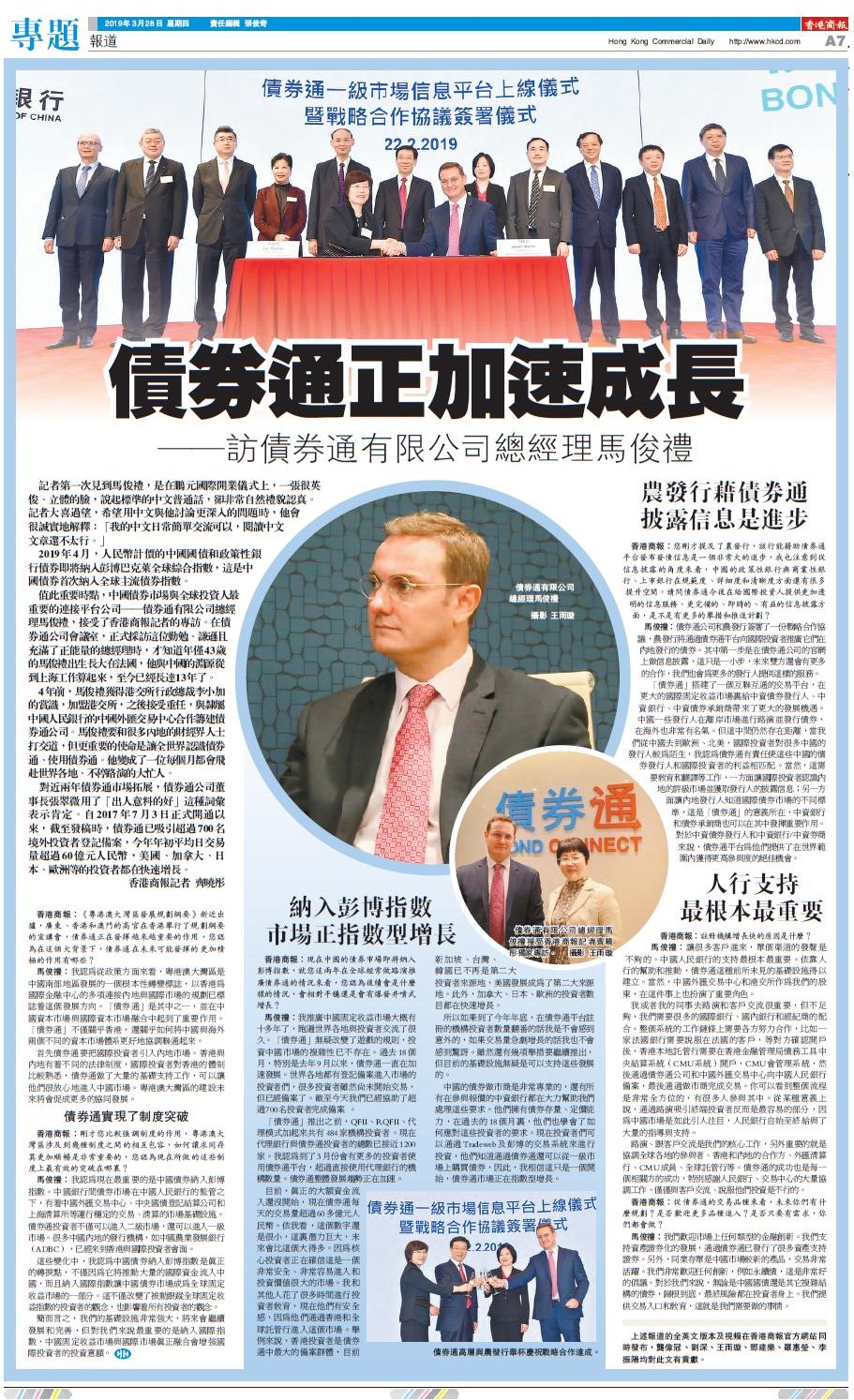【香港商报网讯】記者第一次見到債券通有限公司總經理馬俊禮,是在鵬元國際開業儀式上,一張很英俊、立體的臉,說起標準的中文普通話,卻非常自然禮貌認真。記者大喜過望,希望用中文與他討論更深入的問題時,他會很誠實地解釋:「我的中文日常簡單交流可以,閱讀中文文章還不太行。」
2019年4月,人民幣計價的中國國債和政策性銀行債券即將納入彭博巴克萊全球綜合指數,這是中國債券首次納入全球主流債券指數。
值此重要時點,中國債券市場與全球投資人最重要的連接平台公司--債券通有限公司總經理馬俊禮,接受了香港商報記者的專訪。在債券通公司會議室,正式採訪這位勤勉、謙遜且充滿了正能量的總經理時,才知道年僅43歲的馬俊禮出生長大在法國,他與中國的淵源從到上海工作算起來,至今已經長達13年了。
4年前,馬俊禮獲得港交所行政總裁李小加的賞識,加盟港交所,之後接受重任,與隸屬中國人民銀行的中國外匯交易中心合作籌建債券通公司。馬俊禮要和很多內地的財經界人士打交道,但更重要的使命是讓全世界認識債券通、使用債券通。他變成了一位每個月都會飛赴世界各地、不停路演的大忙人。
對近兩年債券通市場拓展,債券通公司董事長張翠微用了「出人意料的好」這種詞彙表示肯定。自2017年7月3日正式開通以來,截至發稿時,債券通已吸引超過700名境外投資者登記備案,今年年初平均日交易量超過60億元人民幣,美國、加拿大、日本、歐洲等的投資者都在快速增長。香港商報記者 齊曉彤
香港商報:《粵港澳大灣區發展規劃綱要》新近出爐,廣東、香港和澳門的高官在香港舉行了規劃綱要的宣講會,債券通正在發揮越來越重要的作用,您認為在這個大背景下,債券通在未來可能發揮的更加積極的作用有哪些?
馬俊禮:我認為從政策方面來看,粵港澳大灣區是中國南部地區發展的一個根本性轉變標誌,以香港為國際金融中心的多項連接內地與國際市場的規劃已標誌着這個發展方向。「債券通」是其中之一,並在中國資本市場與國際資本市場融合中起到了重要作用。「債券通」不僅關乎香港,還關乎如何將中國與海外兩個不同的資本市場體系更好地協調聯通起來。
首先債券通要把國際投資者引入內地市場。香港與內地有?不同的法律制度,國際投資者對香港的體制比較熟悉,債券通做了大量的基礎支持工作,可以讓他們很放心地進入中國市場。粵港澳大灣區的建設未來將會促成更多的協同發展。

債券通有限公司總經理馬俊禮。攝影 王雨璇
債券通實現了制度突破
香港商報:剛才您比較強調制度的作用,粵港澳大灣區涉及到幾種制度之間的相互包容,如何讓求同存異更加順暢是非常重要的,您認為現在所做的這些制度上最有效的突破在哪裏?
馬俊禮:我認為現在最重要的是中國債券納入彭博指數。中國銀行間債券市場在中國人民銀行的監管之下,有着中國外匯交易中心、中央國債登記結算公司和上海清算所等運行穩定的交易、清算的市場基礎設施。債券通投資者不僅可以進入二級市場,還可以進入一級市場。很多中國內地的發行機構,如中國農業發展銀行(ADBC),已經來到香港與國際投資者會面。
這些變化中,我認為中國債券納入彭博指數是真正的轉捩點,不僅因為它將推動大量的國際資金流入中國,而且納入國際指數讓中國債券市場成為全球固定收益市場的一部分。這不僅改變了被動跟蹤全球固定收益指數的投資者的觀念,也影響?所有投資者的觀念。
簡而言之,我們的基礎設施非常強大,將來會繼續發展和完善,但對我們來說最重要的是納入國際指數,中國固定收益市場與國際市場真正融合會增強國際投資者的投資意願。
納入彭博指數 市場正指數型增長
香港商報:現在中國的債券市場即將納入彭博指數,就您這兩年在全球經常做路演推廣債券通的情況來看,您認為後續會是什麼樣的情況,會相對平穩還是會有爆發井噴式增長?
馬俊禮:我推廣中國固定收益市場大概有十多年了,跑遍世界各地與投資者交流了很久。「債券通」無疑改變了遊戲的規則,投資中國市場的複雜性已不存在。過去18個月,特別是去年9月以來,債券通一直在加速發展。世界各地都有登記備案進入市場的投資者們,很多投資者雖然尚未開始交易,但已經備案了。截至今天我們已經協助了超過700名投資者完成備案 。

債券通有限公司總經理馬俊禮接受香港商報記者齊曉彤獨家專訪。 攝影 王雨璇
「債券通」推出之前,QFII、RQFII、代理模式加起來共有484家機構投資者。現在代理銀行與債券通投資者的總數已接近1200家。我認為到了3月份會有更多的投資者使用債券通平台,超過直接使用代理銀行的機構數量。債券通整體發展趨勢正在加速。
目前,真正的大額資金流入還沒開始,現在債券通每天的交易量超過60多億元人民幣。依我看,這個數字還是很小,這裏潛力巨大,未來會比這個大得多。因為核心投資者正在確信這是一個非常安全、非常容易進入和投資價值很大的市場。我和其他人花了很多時間進行投資者教育,現在他們有安全感,因為他們通過香港和全球託管行進入這個市場。舉例來說,香港投資者是債券通中最大的備案群體,目前新加坡、台灣、韓國已不再是第二大投資者來源地,美國發展成為了第二大來源地。此外,加拿大、日本、歐洲的投資者數目都在快速增長。
所以如果到了今年年底,在債券通平台註冊的機構投資者數量翻番的話我是不會感到意外的,如果交易量急劇增長的話我也不會感到驚訝。雖然還有幾項舉措要繼續推出,但目前的基礎設施無疑是可以支持這些發展的。
中國的債券做市商是非常專業的,還有所有在參與報價的中資銀行都在大力幫助我們處理這些要求。他們擁有債券存量、定價能力,在過去的18個月裏,他們也學會了如何應對這些投資者的要求。現在投資者們可以通過Tradeweb及彭博的交易系統來進行投資,他們知道通過債券通還可以從一級市場上購買債券,因此,我相信這只是一個開始,債券通市場正在指數型增長。

債券通高層與農發行舉杯慶祝戰略合作達成。
農發行藉債券通披露信息是進步
香港商報:您剛才提及了農發行,該行能藉助債券通平台發布發債信息是一個非常大的進步,我也注意到從信息披露的角度來看,中國的政策性銀行與商業性銀行、上市銀行在規範度、詳細度和清晰度方面還有很多提升空間。請問債券通今後在給國際投資人提供更加透明的信息服務、更完備的、即時的、有益的信息披露方面,是不是有更多的舉措和推進計劃?
馬俊禮:債券通公司和農發行簽署了一份戰略合作協議,農發行將通過債券通平台向國際投資者推廣它們在內地發行的債券。其中第一步是在債券通公司的官網上做信息披露,這只是一小步,未來雙方還會有更多的合作,我們也會為更多的發行人提供這樣的服務。
「債券通」搭建了一個互聯互通的交易平台,在更大的國際固定收益市場裏給中資債券發行人、中資銀行、中資債券承銷商帶來了更大的發展機遇。中國一些發行人在離岸市場進行路演並發行債券,在海外也非常有名氣。但這中間仍然存在距離,當我們從中國去到歐洲、北美,國際投資者對很多中國的發行人較為陌生,我認為債券通有責任使這些中國的債券發行人和國際投資者的利益相匹配。當然,這需要教育和翻譯等工作,一方面讓國際投資者認識內地的評級市場並獲取發行人的披露信息;另一方面讓內地發行人知道國際債券市場的不同標準,這是「債券通」的意義所在,中資銀行和債券承銷商也可以在其中發揮重要作用。對於中資債券發行人和中資銀行/中資券商來說,債券通平台為他們提供了在世界範圍內獲得更高參與度的絕佳機會。
人行支持最根本最重要
香港商報:註冊機構增長快的原因是什麼?

馬俊禮:讓很多客戶進來,單個渠道的發聲是不夠的。中國人民銀行的支持最根本最重要。依靠人行的幫助和推動,債券通這種前所未見的基礎設施得以建立。當然,中國外匯交易中心和港交所作為我們的股東,在這件事上也扮演了重要角色。
我或者我的同事去路演和客戶交流很重要,但不足夠,我們需要很多的國際銀行、國內銀行和經紀商的配合。整個系統的工作鏈條上需要各方努力合作,比如一家法國銀行需要說服在法國的客戶,等對方確認開戶後,香港本地託管行需要在香港金融管理局債務工具中央結算系統(CMU系統)開戶,CMU會管理系統,然後通過債券通公司和中國外匯交易中心向中國人民銀行備案,最後通過做市商完成交易。你可以看到整個流程是非常全方位的,有很多人參與其中。從某種意義上說,通過路演吸引終端投資者反而是最容易的部分,因為中國市場是如此引人注目,人民銀行自始至終給與了大量的指導與支持。
路演、跟客戶交流是我們的核心工作,另外重要的就是協調全球各地的參與者、香港和內地的合作方、外匯清算行、CMU成員、全球託管行等。債券通的成功也是每一個相關方的成功,特別感謝人民銀行、交易中心的大量協調工作。僅僅與客戶交流、說服他們投資是不行的。
香港商報:從債券通的交易品種來看,未來你們有什麼規劃?是否歡迎更多品種進入?是否只要有需求,你們都會做?
馬俊禮:我們歡迎市場上任何類型的金融創新。我們支持資產證券化的發展,通過債券通已發行了很多資產支持證券。另外,同業存單是中國市場較新的產品,交易非常活躍。我們非常歡迎任何創新,例如永續債,這是非常好的倡議。對於我們來說,無論是中國國債還是其它複雜結構的債券,歸根到底,最終風險都在投資者身上。我們提供交易入口和教育,這就是我們需要做的事情。
上述報道的全英文版本及視頻在香港商報官方網站同時發布,龔偉冠、劉深、王雨璇、鄧建樂、羅惠瑩、李振陽均對此文有貢獻。

Julien Martin :Bond Connect Accelerating Growth
The reporter first met Julien Martin at the opening ceremony of Pengyuan International Credit Rating Company. A handsome gentleman with clear-cut facial features, Julien speaks standard Mandarin Chinese in a very natural and polite manner. At that time the reporter was excited and hoped to discuss more in-depth issues with him in Chinese, he explained very humbly: "My Chinese can be used for simple daily communication, but not enough for reading Chinese articles."
On the occasion that the Chinese bond market is going to be included in the Bloomberg Index, the reporter interviewed the General Manager, who is diligent, humble and full of positive energy, in the conference room of Bond Connect Company Limited (BCCL).
During the official interview, the reporter realized that Julien, aged 43, was born and grown up in France. His relationship with China has been 13 years long, when counting from his work in Shanghai.
Four years ago, Julien was invited by Charles Li, Chief Executive of HKEX, to join HKEX. Julien then accepted the heavy responsibility and cooperated with CFETS of the PBoC to build BCCL. Julien needs to deal with many people in the financial sector in mainland China, but the more important mission is to let the world know about Bond Connect and use Bond Connect. He has become a busy man who flies around the world every month to conduct roadshows.
Commenting the development of Bond Connect in the past two years, Zhang Cuiwei, Chairperson of BCCL, expressed her affirmation with the words "unexpectedly good". Since its official launch on July 3, 2017, Bond Connect has now (as of the date of this press release) attracted more than 700 registered foreign investors, with an average daily trading volume of over RMB 6 billion early this year. Number of investors in the US, Canada, Japan, and Europe is growing rapidly.
Bond Connect: a Game Changer
HKCD: The Outline of the Development Plan of Guangdong, Hong Kong and Macao Greater Bay Area was published recently. Senior officials from three places across the Straits held a lecture on the Outline of the Plan in Hong Kong yesterday. Bond Connect is playing an increasingly important role with the policy favors. What are the more positive roles that Bond Connect may play in the future?
Julien:I think the Greater Bay Area has been an earmark of the fundamental change of the economy in Southern China. Several projects led by Hong Kong, as the financial center, have been marked to be further developed, Bond Connect being one of them. Bond Connect gives an important role to Hong Kong in the integration of Chinese capital market with the international ones. Bond Connect is not only about Hong Kong, but about China and the world, and how these two different capital-raising systems can work better together.
The first step for us is to bring in international investors to the Chinese market. Hong Kong, with its different legal system, gives a lot of support to international investors to enter the Chinese market in a very secured way, with an infrastructure that they know very well out of Hong Kong. The Greater Bay area initiative will probably facilitate more of this work going forward.
HKCD: Just now, you emphasized the role of the regime system. Seeking the mutual tolerance at common ground more stably while reserving differences of regime systems which Greater Bay Area of Guangdong, Hong Kong and Macao involves is very important. How do you think about these most effective breakthroughs of the systems?
Julien:Bloomberg Index inclusion is the most important part. We have a very solid system based on the mainland regulation of PBOC and infrastructure of CFETS, and the clearing houses like CCDC and Shanghai Clearing House. We have access to not only the secondary market but also the primary market. There are already a lot of Mainland Chinese issuers, like Agricultural Development Bank of China (ADBC), coming and meeting international investors.
With all of these in place, the turning point for us is going to be the index inclusion, not only because it will drive a lot of flows into China, but also because it gives the recognition of the market in China as being part of global fixed income market. That is the fundamental change in sentiment not only from the investors that are tracking passively the global fixed income indices but for anyone. In short, the infrastructure is strong, will be improved, and will continue to evolve, but the most important for us is the index inclusion because it gives comfort to international investors about the future of the real integration of Chinese fixed income market with the rest of the international community.
ADBC enhances information disclosure through Bond Connect
HKCD: As you mentioned just now, the ADBC has made great progress in issuing bond issuance information by means of Bond Connect platform. I also noticed that from the perspective of information disclosure, there is still much room for China's policy banks, commercial banks and listed banks to improve their standardization, detail and clarity. Which new acts will Bond Connect introduce in terms of information disclosure on the clarity of the information service and better, instant, useful news disclosure in the future?
Julien: Today we signed an MOU with the Agriculture Development Bank of China. The MOU is about promotion of their issuance in Mainland China to international investors. One step is the disclosure of their issuance papers on our website. It is a small step, and we can do a lot more. We can also help many other issuers.
With Bond Connect, we have generated a system that gives a unique opportunity to both Chinese issuers and Chinese banks/Chinese brokers to gain a larger role in the greater fixed income market. There are some issuers in China that are very well-known overseas because they issue a lot in the offshore market and do a lot of roadshows, but there is still a very big gap in other international market (e.g. Europe, North America). There are a lot of Chinese issuers that are completely unknown to these international players. I believe we have a role to make the interests of those Chinese issuers and those international investors match. It requires education, translation, and that we are able to make them understand rating, disclosure and the different standards of Chinese and international markets. It is our key role to help, and Chinese banks and securities firms can also play an important part. Bond Connect is a fantastic opportunity for both Chinese issuers and Chinese banks/securities firms to have a greater exposure in the world.
HKCD: ADBC has a big gap in information disclosure compared with the listed commercial banks because it is a policy bank and considers itself basically equal to the national credit, so it seldom introduces how to use every sum of money or its overall business structure when issuing bonds. Domestic listed companies issue bonds on exchanges, the individual disclosure documents will be about 50 pages, but ADBC may only disclose 4-5 pages, so its gap is very large. Normative and transparent disclosure awareness needs to be strengthened.
Julien: You can already see their first effort, that is all their disclosure documents now exist in English. ISIN code is also implemented for most of the Chinese market. ADBC is extremely well-known in Mainland China, and their issues are very well distributed to all the banks and to all the buy-sides. In the international market, it is also a very good name because it is a precursor for Green Bonds or ESG friendly bonds. It fits perfectly with a lot of Hong Kong initiatives, e.g. the Hong Kong Green Bond initiative, the ESG friendly initiative, promoting Hong Kong as a listing market, etc. ADBC is making a lot of efforts because they need to adapt to a new type of customers who do not necessarily know them well. I am very appreciative of what they do, and they are the perfect candidate for this kind of initiative to start with.
Exponential Growth with Index Inclusion
HKCD: Now China's bond market is about to be included in Bloomberg Barclays Global Aggregate Index. In terms of the fact that you have been doing roadshows in the past two years to promote Bond Connect all over the world, what do you think will happen in the future, will it be relatively stable or will have explosive growth?
Julien:I have been promoting the Chinese fixed income market for more than 10 years. I have talked to investors across the globe for a very long time on this market. Bond Connect is a game changer. The whole complexity of accessing China is gone. From what we have seen in the last 18 months of the Bond Connect project, and even more recently, Bond Connect will just accelerate. We have investors from all over the world that are registering to access the market. Most of these investors have already registered but not started trading yet. We have close to 620 investors already registered today (more than 700 as of the date of this press release).
Before the launch of Bond Connect, there were all together, with QFII, RQFII, Agent Bank Model, 484 investors. Now there are close to 1,200 in CIBM banks and Bond Connect together. I think by March there will be more investors using Bond Connect than CIBM banks. We can see the trend is accelerating.
We haven't even started seeing the large inflows. Recently we have more than 6 billion RMB every day trading through Bond Connect. My view is that it is still very small and there is so much potential. It is going to be a lot bigger than this, simply because the core investors are being convinced that they need to have exposure to a market that is very secure, very easy to access, and does add a lot of value. They understand this market because we and others spend a lot of time educating them on the market. Now they also have security because they access this market through Hong Kong and through their global custodians. One example is that Hong Kong investors are still the largest registrants in Bond Connect. However, it is no longer Singapore, Taiwan or Korea as the second, but it is now the US. Besides, Canada, Japan and Europe as a whole are growing very fast.
I wouldn't be surprised by the end of the year we will have double the number of investors in the market, and I wouldn't be surprised to see the trading volume increase dramatically. There are several initiatives that we are working on but the infrastructure in place right now can definitely handle that.
All our dealers in China are very professional, and all the Chinese banks in China that are operating as dealers are helping us massively in dealing with those requests. They have inventory, pricing capability, and have learnt from the last 18 months how to answer the requests from the investors. We have the trading system at Tradeweb and Bloomberg that are available. Now people know that they can also buy all those bonds from primary market. Therefore I think it is just the beginning, and Bond Connect is just going to accelerate exponentially.
Fundamental Support from PBoC
HKCD: Just now you mentioned that there are more than 7600 organizations registered. Which organizations know you through your roadshow and then recognize the market? How many have known it from other channels? The BCCL Chairperson Zhang Cuiwei's evaluation of Bond Connect is unexpectedly good and fast. Is this related to your strategy and effectiveness in conducting roadshows around the world?
Julien:To get those clients to come in, one voice is not enough. Firstly, the fundamental support of PBOC has been extremely important. They have been operating in a proactive way to promote Bond Connect. CFETS and HKEX, being our shareholders, also play an important role.
It is not enough that I or my colleagues go and talk to clients, we also need the international and Chinese banks/brokers. The whole chain works because everybody works together, e.g. from the bankers in France that are going to convince their clients to open the account with them, to their local custodians in Hong Kong that will open up their CMU accounts, to our partners in CMU that will be managing the system, to us onboarding the customers with the help of CFETS and the ultimate filing by PBOC, and then the dealers in China that will be operating the trade. The whole scheme on paper is actually very comprehensive. There are a lot of people that are involved in each of these cases. To attract the end investors, to some extent, is the easiest part, because the Chinese market is so compelling and PBOC is making so many efforts.
It is our core activity to talk to these people but there is another very important part, that is to coordinate all the different players, from Germany, US, Hong Kong industry and the Mainland partners that are helping us all together, the FX banks, the CMU members, the global custodians, and so on and so forth. I think the success is really for everybody. Special thanks to the coordination of PBOC and CFETS in this whole project. In short, it requires a lot of work, so just talking to customers convincing them to invest is not enough.
HKCD: Judging from the variety of Bond Connect, what are your plans for the future? Are more varieties welcome? Are you going to do it whenever are demanded?
Julien: Typically we welcome any types of financial innovation in the market. We are already very active on asset backed securities. There is a lot of distribution on asset backed securities through Bond Connect. We also have been very active on NCD, the relatively new product in the Chinese market. Therefore, any new type of bonds, e.g. perpetual bond, is a very great initiative, and is going to be treated like any other initiatives. For us, whether it is Chinese government bond or very complex structured debt, the risk is with the investors. We provide access and understanding, this is what we need to do.
HKCD: Many people are very concerned about the "Southbound Trading" of Bond Connect. What are the latest developments of "Southbound Trading"?
Julien: We will continue to explore "Southbound Trading".
Reporter:QI XIAOTONG



